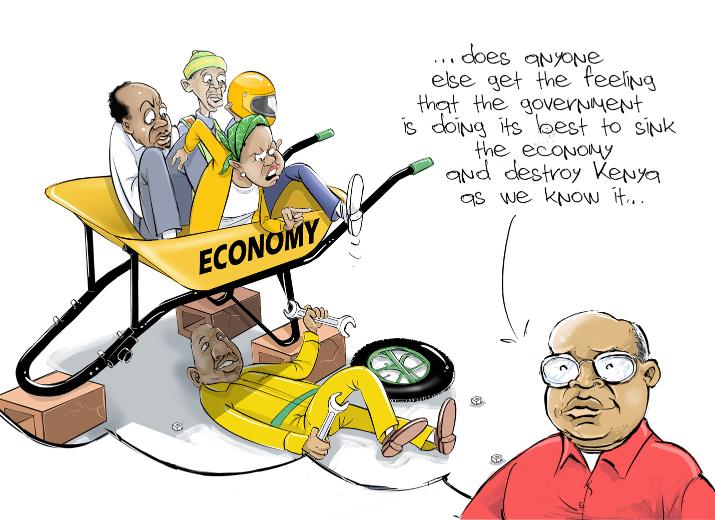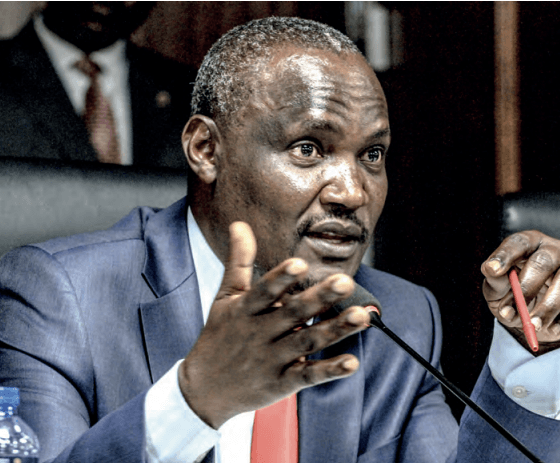

Does anyone else get the feeling that the government is doing its best to sink the economy and destroy Kenya as we know it? Or is it just me and a friend letting our imaginations run wild?
A friend and I were chatting about this the other day, and while we could see various signs that there is some sort of mission to live up to the “Kenya Kwisha” tag that some have attached to the Kenya Kwanza government, we cannot for the life of us figure out why.
For instance, there was the decidedly bizarre statement from the President as he took over the rotational chair of the East African Community.
He was reported as having “commended Tanzania for taking the lead in trading goods and services within the East African Community”.
The President,
who I believe should be championing Kenyan interests, instead hailed Tanzania
for dethroning Kenya as the lead East African economy.
But then again, all his government’s unpopular and anti-growth measures seem to have pointed to this finishing off of the Kenyan economy. Soon we could be at the tail end, unless like a magician, he pulls a rabbit out of the hat.
Look at some of the evidence since September 2022, when several bills presented to Kenya's Parliament, particularly those concerning economic and social policies, have provoked significant public discontent.
Everyone knows about the Finance Bills 2023 and 2024. We were told that the purpose of both bills was to raise revenue through new taxes, and that these bills aimed to address Kenya's growing budget deficit and public debt.
However, the bills contained several contentious provisions, including the introduction of new levies on basic commodities such as bread, sugar and cooking oil.
There was also an "eco-levy" on manufactured goods, including diapers and sanitary towels.
Probably the most contentious measure for anyone with a payslip was the 1.5 per cent housing levy on employee salaries, as well as the proposed annual motor vehicle circulation tax pegged at 2.5 per cent of the vehicle's value.
Unless you have been living under a rock, you will be aware of the fact that these measures sparked widespread protests and further inflamed public frustration over the rising cost of living.
Demonstrators argued that the taxes disproportionately affected low-income households and small businesses. Protests were fuelled further by the perception that the government had prioritised IMF directives over citizens' welfare.
We also all know, thanks to the Kenya Human Rights Commission, that 65 Kenyans were killed by police and 60 demonstrators were abducted and disappeared for their protests against these obnoxious bills.
The Privatisation Bill 2023 also didn’t make sense. This bill sought to expedite the privatisation of state-owned enterprises by reducing parliamentary oversight.
Even though the current Parliament has been fairly useless with regard to its oversight role, many people still felt that further reducing parliamentary oversight would be laying out the red carpet for even more corruption.
Surely anyone with the good of the country in their conscience could see that a lack of transparency and accountability just enables corruption.
The bill was challenged in court, as several decisions taken by successive governments since 2013 have been.
High Court judge Chacha Mwita said the application raised constitutional and legal issues of public importance that required critical examination.
Apart from
corruption, there were also fears that privatisation would lead to job losses
and reduced access to essential services.
For us in the media, the proposed changes to the law on media regulation
contained in the innocuously named Statute Law (Miscellaneous Amendments) Bill
2023 were seriously problematic.
This was because these changes were seen as a potential crackdown on press freedom.
There were
also amendments to election laws that the opposition claimed could undermine
electoral transparency.
Civil
society groups and journalists protested these provisions, arguing that they
threatened democracy and freedom of expression.
As my friend asked, what do they hope to achieve with this slash-and-burn
approach? It’s all very confusing, and I’d love to hear from someone who sees the whole picture and gets it.













